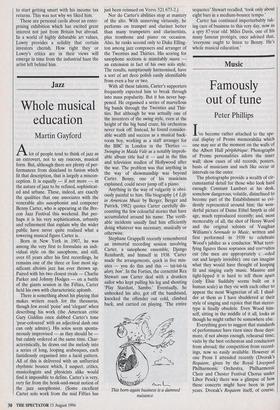Jazz
Whole musical education
Martin Gayford
Alot of people tend to think of jazz as an extrovert, not to say raucous, musical form. But, although there are plenty of per- formances from dixieland to fusion which fit that description, that is largely a miscon- ception. It is equally — if not more — in the nature of jazz to be refined, sophisticat- ed and urbane. These, indeed, are exactly the qualities that one associates with the venerable alto saxophonist and composer Benny Carter, who is appearing at the Bre- con Jazz Festival this weekend. But per- haps it is his very sophistication, urbanity and refinement that explain why the wider public have never quite realised what a towering musical figure Carter is.
Born in New York in 1907, he was among the very first to formulate an indi- vidual style on the saxophone, and still, over 65 years after his first recordings, he remains one of the three or four most sig- nificant altoists jazz has ever thrown up. Paired with his two closest rivals — Charlie Parker and Johnny Hodges — on a battle of the giants session in the Fifties, Carter held his own with characteristic aplomb.
There is something about his playing that makes writers reach for the thesaurus, though few avoid 'poise' and 'elegant' when describing his work (the American critic Gary Giddins once dubbed Carter's tone `pear-coloured' with an adjectival dash one can only admire). His solos seem sponta- neously improvised — as they should be but calmly ordered at the same time. Char- acteristically, he draws out the melody into a series of long, looping arabesques, each fastidiously organised into a lucid pattern. All of this is delivered with an unflurried rhythmic bounce which, I suspect, critics, musicologists and physicists alike would find it impossible to define. Carter's is very, very far from the honk-and-sweat notion of the jazz saxophonist. (Some excellent Carter solo work from the mid Fifties has just been reissued on Verve 521 673-2.) Nor do Carter's abilities stop at mastery of the alto. With unnerving virtuosity, he performs on trumpet and clarinet better than many trumpeters and clarinettists, plus trombone and piano on occasion. Also, he ranks second only to Duke Elling- ton among jazz composers and arranger of the Twenties and Thirties. His scoring for saxophone sections is inimitably suave an extension in fact of his own solo style. The results, sumptuously harmonised, have a sort of art deco polish easily identifiable from even a bar or two.
With all these talents, Carter's supporters frequently expected him to break through into mass popularity. But it has never hap- pened. He organised a series of marvellous big bands through the Twenties and Thir- ties. But although he was actually one of the inventors of the swing style, even at the height of the big band craze, his orchestras never took off. Instead, he found consider- able wealth and success as a musical back- room boy, working as a staff arranger for the BBC in London in the Thirties Swinging in Maida Vale as a notably improb- able album title had it — and in the film and television studios of Hollywood after the war. The problem was that anything in the way of showmanship was beyond Carter. Benny, one of his musicians explained, could never jump off a piano.
Anything in the way of vulgarity is obvi- ously painful to him. His biography (A Life in American Music by Berger, Berger and Patrick, 1982) quotes Carter carefully dis- counting the few colourful stories that have accumulated around his name. The verifi- able incidents usually find him efficiently doing whatever was necessary, musically or otherwise.
Stephane Grappelli recently remembered an immortal recording session involving Carter, a saxophone ensemble, Django Reinhardt, and himself in 1938. 'Carter made the arrangements, quick in five min- utes — you do this and this — tat-tat-ta alors, bon'. In the Forties, the cornettist Rex Stewart saw Carter deal with a drunken sailor who kept pulling his leg and shouting `Play Stardust, Samba.' Eventually, he unhooked his alto, got off the bandstand, knocked the offender out cold, climbed back, and carried on playing. "Me entire This born-again business is a damned nuisance. sequence' Stewart recalled, 'took only about eight bars in a medium-bounce tempo.'
Carter has continued imperturbably tak- ing care of business to this very day, now as a spry 87-year old. Miles Davis, one of his many famous protégés, once advised that, `everyone ought to listen to Benny. He's whole musical education.'










































 Previous page
Previous page